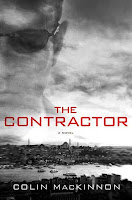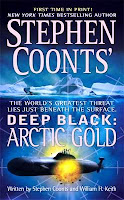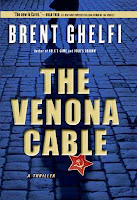 It has taken me a few years, but I have finally gotten around to reading the first James Bond novel Casino Royale by Ian Fleming. I’ve been watching the Bond incarnations all my life: some I’ve loved, some I’ve tolerated, and some I’ve waited to just go away. The print Bond was an eye-opener. Strip away the gadgets, the glamour and the one-liners and you will find the man who is intelligent, ruthless, flawed and sometimes frightened.
It has taken me a few years, but I have finally gotten around to reading the first James Bond novel Casino Royale by Ian Fleming. I’ve been watching the Bond incarnations all my life: some I’ve loved, some I’ve tolerated, and some I’ve waited to just go away. The print Bond was an eye-opener. Strip away the gadgets, the glamour and the one-liners and you will find the man who is intelligent, ruthless, flawed and sometimes frightened.
 Spy fiction has changed in the wake of technological advances. In many ways, Casino Royale is old fashioned with its battle of nerve and wit over the baccarat table. Agents are valued for their ability to infiltrate databanks as much as for their skills as double agents. The spy novel has morphed into the techno thriller. Larry Bond writes a series of novels (First Team) involving a team of elite operatives who use unconventional means to infiltrate terrorist organizations.
Spy fiction has changed in the wake of technological advances. In many ways, Casino Royale is old fashioned with its battle of nerve and wit over the baccarat table. Agents are valued for their ability to infiltrate databanks as much as for their skills as double agents. The spy novel has morphed into the techno thriller. Larry Bond writes a series of novels (First Team) involving a team of elite operatives who use unconventional means to infiltrate terrorist organizations.
The enemy has also changed. The Cold War marked the height of the western spy novel with operatives like
Bond and
George Smiley. The end of the Cold War meant the end of the bad guy and spy fiction suffered accordingly. The events of September 2001 gave spy novels a new life and direction. Now books such as
The Increment by
David Ignatius,
The Contractor by
Colin MacKinnon and
Rules of Vengeance by Christopher Reich cast their suspicious eye towards terrorist organizations.



This is not to say that we have totally abandoned the Russians. Russia continues to be a favourite in books such as
Stephen Coont’s Deep Black Arctic Gold by
Stephen Coonts and
William H. Keith and
The Venona Cable by
Brent Ghelfi. In Ghelfi’s novel sometimes Russian agent and sometimes criminal Alexei Volkovoy must clear himself of a murder. The victim is found with information regarding an encrypted cable concerning a meeting between Churchill and Roosevelt and information connecting him to Volk’s father who may have been an agent or a traitor.
Common throughout all of these novels is the appeal of the spy him or herself. Whether they are government sanctioned or funded MacGyver-style through an agency, they must have the intelligence, wit and complexity to get the job done and keep our attention. An excellent example of an appealing agent is Milo Weaver in
The Tourist by
Olen Steinhauer. Weaver is a retired agent forced back into active duty to clear his name of murder. The burnt out agent had been on the verge of suicide before he reinvented his life as happy family man. Rumour has it that George Clooney has bought the rights to produce and star in the film version.

 It has taken me a few years, but I have finally gotten around to reading the first James Bond novel Casino Royale by Ian Fleming. I’ve been watching the Bond incarnations all my life: some I’ve loved, some I’ve tolerated, and some I’ve waited to just go away. The print Bond was an eye-opener. Strip away the gadgets, the glamour and the one-liners and you will find the man who is intelligent, ruthless, flawed and sometimes frightened.
It has taken me a few years, but I have finally gotten around to reading the first James Bond novel Casino Royale by Ian Fleming. I’ve been watching the Bond incarnations all my life: some I’ve loved, some I’ve tolerated, and some I’ve waited to just go away. The print Bond was an eye-opener. Strip away the gadgets, the glamour and the one-liners and you will find the man who is intelligent, ruthless, flawed and sometimes frightened. Spy fiction has changed in the wake of technological advances. In many ways, Casino Royale is old fashioned with its battle of nerve and wit over the baccarat table. Agents are valued for their ability to infiltrate databanks as much as for their skills as double agents. The spy novel has morphed into the techno thriller. Larry Bond writes a series of novels (First Team) involving a team of elite operatives who use unconventional means to infiltrate terrorist organizations.
Spy fiction has changed in the wake of technological advances. In many ways, Casino Royale is old fashioned with its battle of nerve and wit over the baccarat table. Agents are valued for their ability to infiltrate databanks as much as for their skills as double agents. The spy novel has morphed into the techno thriller. Larry Bond writes a series of novels (First Team) involving a team of elite operatives who use unconventional means to infiltrate terrorist organizations.







